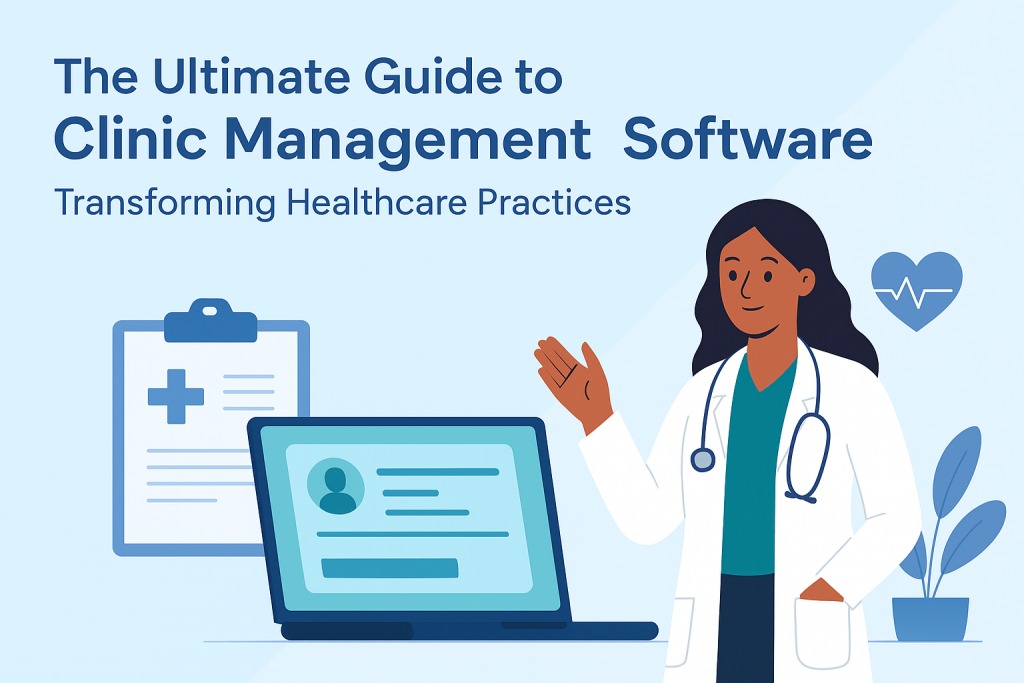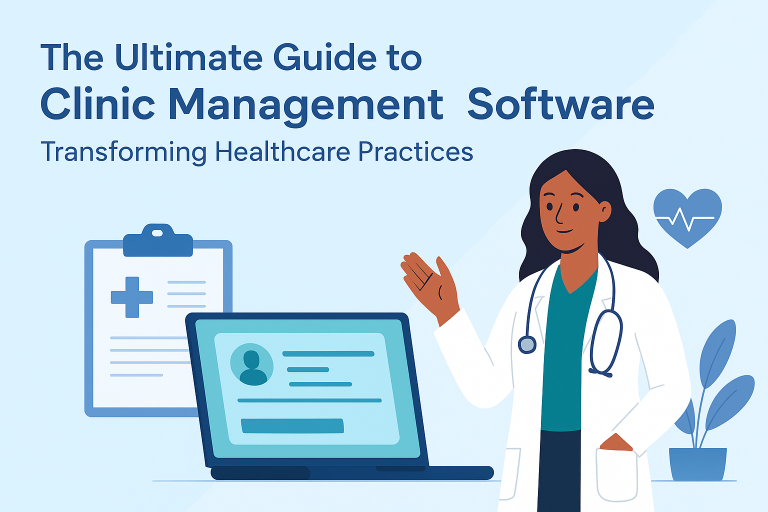Clinics are not an exception to the fast-paced evolution of healthcare. In fact, with the surge of digital transformation, clinic management software has become an indispensable tool for healthcare providers. Whether you run a small clinic or a multi-specialty healthcare center, leveraging such software can streamline operations, reduce administrative burdens, and ultimately improve patient care.
Therefore, in this comprehensive guide, we’ll explore everything you need to know about clinic management software, its benefits, use cases, and how to choose the right one for your healthcare practice. Moreover, we’ll also discuss real-world examples, industry trends, and address frequently asked questions.
What is Clinic Management Software?
The daily operations of medical clinics and facilities are managed using a digital application known as clinic management software. For example, from scheduling appointments and maintaining patient records to handling billing and generating reports, this software acts as a one-stop solution for streamlining clinical workflows.
Consequently, it eliminates paperwork, reduces errors, and helps healthcare providers focus on what matters most—patient care.
Why is Clinic Management Software Important?
Healthcare professionals often face administrative challenges such as appointment mismanagement, billing errors, and compliance issues. On the other hand, manual systems make it difficult to manage patients efficiently. Therefore, clinic management software bridges this gap by offering an integrated platform that automates tasks.
Key Benefits:
- Efficient Appointment Scheduling: Reduces double-bookings and no-shows with automated reminders.
- Comprehensive Patient Records: Stores patient history, prescriptions, test reports, and more in one place.
- Streamlined Billing and Invoicing: With built-in medical billing software, clinics can manage insurance claims and generate invoices seamlessly.
- Data Security and Compliance: Ensures patient data privacy with secure and compliant systems.
- Analytics and Reporting: Provides insights into revenue, patient visits, and staff performance.
As a result, clinics can focus more on quality care rather than administrative hassles.
Features of a Modern Clinic Management Software
To choose the right clinic management software, it’s crucial to understand its key features. Moreover, these features not only enhance efficiency but also ensure patient satisfaction.
- Appointment Management– Automates scheduling, sends SMS/email reminders, and allows patients to book appointments online.
- Patient Information System– Digitally stores detailed patient records, ensuring quick retrieval whenever needed.
- Billing and Payment Integration– Supports medical billing software features, including insurance claim processing, payment gateways, and e-invoices.
- Telemedicine Support– Offers online consultations through secure video conferencing.
- Inventory and Pharmacy Management– Keeps track of medications and supplies and notifies users when there is a shortage.
- Reporting and Analytics– Generates detailed reports for financial tracking, patient feedback, and staff productivity.
- Cloud-Based Access– Allows doctors to access clinic data from anywhere at any time.
Thus, these features combine to create an ecosystem that makes healthcare operations seamless.
Clinic Management Software in India
The demand for clinic management software India is booming as healthcare digitization accelerates. Indeed, clinics in both urban and rural areas are adopting these tools to improve patient experience.
Why India is Adopting Fast:
- Increased smartphone and internet penetration.
- Rising demand for telemedicine post-COVID-19.
- Government initiatives supporting healthcare IT.
- Affordable cloud-based software solutions.
For instance, small-town clinics that previously relied on manual registers are now adopting cloud-based platforms to streamline operations and attract patients who prefer digital interactions.
Real-World Case Study
Consider a mid-sized multi-specialty clinic in Bangalore. Before implementing clinic management software, they struggled with missed appointments, delayed billing, and patient dissatisfaction.
However, after integrating a cloud-based solution:
- Appointment cancellations reduced by 40%.
- Billing efficiency improved by 60% with medical billing software.
- Patient satisfaction ratings increased by 30%.
Consequently, this example showcases how technology can drastically improve clinic performance.

How Practo Clone App Solution Companies Help
With the growing popularity of telemedicine, many healthcare businesses are looking to develop apps similar to Practo. A Practo Clone App Solution Company can build customized platforms with clinic management features, online consultations, and integrated billing.
Moreover, these companies provide ready-to-launch apps tailored to clinics, hospitals, and healthcare startups, helping them enter the digital healthcare space quickly.
How to Choose the Right Clinic Management Software
The size, budget, and particular requirements of your clinic will determine which option is best. Therefore, here’s a checklist:
- Ease of Use – The interface should be simple for doctors and staff to use.
- Scalability – Ensure the software can grow with your clinic.
- Customization – Features should be customizable to your practice’s needs.
- Integration – Must integrate with medical billing software, pharmacy systems, and labs.
- Support and Training – Check if the vendor provides onboarding and customer support.
In addition, always request a demo before finalizing to ensure usability.
Future Trends in Clinic Management Software
The healthcare sector is witnessing significant advancements. Therefore, some upcoming trends include:
- AI and Predictive Analytics: AI-powered tools to forecast patient volume and suggest therapies.
- Blockchain for Data Security: Enhanced security for sensitive patient data.
- Wearable Integration: Linking wearables to patient records for real-time health monitoring.
- Telemedicine Expansion: Increasing adoption of online consultations.
- IoT Devices: Connecting diagnostic devices directly with patient management systems.
As a result, the future of healthcare will become more interconnected and patient-centered.
Frequently Asked Questions (FAQs)
Q1. What is clinic management software used for?
It is used for managing appointments, billing, patient records, inventory, and reports in clinics and healthcare facilities.
Q2. How does medical billing software help?
It automates invoicing, insurance claims, and payment collection, reducing errors and saving time.
Q3. Is clinic management software expensive?
No. In fact, many affordable solutions are available, including cloud-based options that charge on a subscription basis.
Q4. Can small clinics benefit from a Practo Clone App Solution Company?
Yes, they can provide customized apps with integrated features like teleconsultation, scheduling, and billing, even for smaller clinics.
Q5. Is clinic management software secure?
Yes, most modern systems comply with data protection laws and use encryption to ensure patient privacy.
Conclusion
In the digital age, where patient expectations are higher than ever, clinics can no longer afford outdated manual systems. Therefore, clinic management software provides a holistic solution to streamline operations, improve accuracy, and boost patient satisfaction. From integrating medical billing software to supporting telemedicine, it’s the future of healthcare management.
Particularly in regions like India, where healthcare demand is rising, adopting such systems isn’t just beneficial—it’s essential.
If you’re a healthcare provider or entrepreneur looking to modernize your operations, then now is the time to invest in a reliable clinic management solution. Ultimately, don’t fall behind; digital healthcare is the way of the future!

